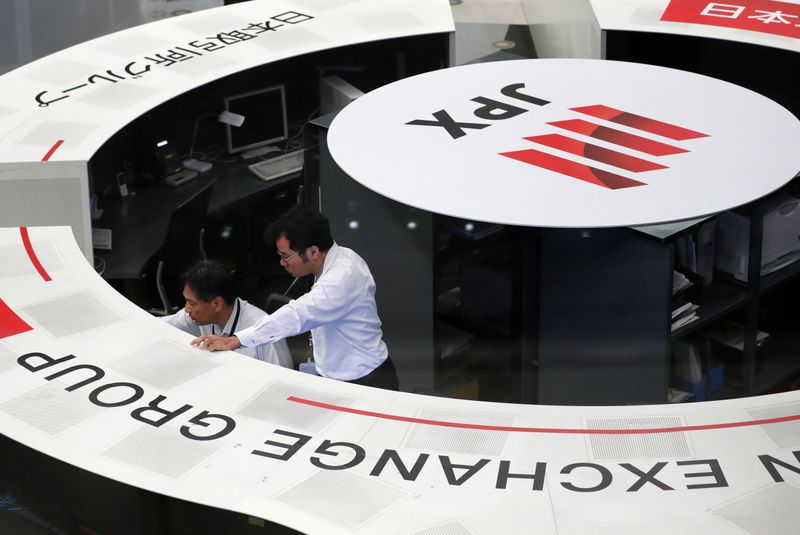By Stanley White and Chibuike Oguh
TOKYO/NEW YORK (Reuters) - Most Asian shares ground higher while U.S. stock futures fell on Tuesday amid choppy trade as a renewed decline in oil prices partially offset optimism about the easing of coronavirus-related restrictions.
MSCI's broadest index of Asia-Pacific shares outside Japan (MIAPJ0000PUS) was down 0.2%. Shares in China (CSI300) rose 0.65%. South Korean shares (KS11) gained 0.4%, but shares in Japan (N225) were little changed.
Euro Stoxx 50 futures (STXEc1) were up 0.25%, German DAX futures (FDXc1) climbed 0.42%, and FTSE futures (FFIc1) rose 0.27%, suggesting European shares are poised to gain.
Oil futures slumped after the largest U.S. oil exchange-traded fund said it would sell all its front-month crude contracts to avoid further losses as prices collapse.
Regional stock markets see-sawed between positive and negative territory throughout the Asian session, amid low trading volumes and as the focus swung between the oil panic and encouraging signs on the coronavirus front.
Some investors are hoping the worst may be over for the world economy as more countries allow businesses to re-open, but others see reasons to remain cautious, especially as a coronavirus vaccine has yet to be developed.
"We are less optimistic and expect a slower recovery in the world economy," Commonwealth Bank of Australia said in a research note.
"The risk of reintroducing restrictions is a risk to market participants' optimistic outlook for a quick resumption of normal economic activity."
All three major U.S. stock averages advanced on Monday and are all now within 20% of their record closing highs reached in February.
The benchmark S&P 500 is on track for its best month since 1987, after trillions of stimulus dollars helped U.S. equities claw back much of the ground lost since the coronavirus crisis brought the economy to a grinding halt.
From Italy to New Zealand, governments announced the easing of restrictions, while Britain said it was too early to relax them there. New York state is not expected to reopen for weeks..
Oil prices weakened again on persistent concerns about oversupply and a lack of storage space. The front-month contract was trading at lower-than-usual volumes on Monday as traders moved to later months in futures contracts.
U.S. crude (CLc1) skidded 12.21% to $11.22 a barrel while Brent crude (LCOc1) fell 3.95% to $19.20 per barrel.
Shares of United States Oil Fund LP (P:USO), the country's largest crude ETF, fell more than 16% on Monday, after it said it would sell all of its front-month crude contracts to avoid a repeat of the heavy losses suffered last week.
The U.S. dollar and the euro were little changed as traders refrained from taking big positions before a Federal Reserve policy decision due on Wednesday and a European Central Bank (ECB) meeting Thursday.
The Fed has already announced a raft of measures to lessen the economic blow from the coronavirus pandemic and is expected to stay on hold this week.
The ECB is likely to extend its debt purchases to include junk bonds and provide a backstop for corporate financing.
Major central banks have responded to the economic slump caused by the coronavirus by slashing interest rates, buying more government debt, and taking steps to increase lending to small companies.
The slide in oil prices knocked the Australian dollar
The New Zealand dollar

Gold
